Pete Sutton's Blog, page 32
July 3, 2015
Archipelacon

So that was a foreign Con. Got to say it was one of the best Cons I've ever been to. So well organised, so much to do, lots of interesting people, just really, really good. Well done to everyone involved.
We checked out the flights and it seemed to be cheaper to go via Stockholm, also I'd not been to Stockholm (except once with the day job for a day & saw nothing) so Stockholm seemed the better choice.
We booked different ferries from most of the folk that were going to the con and didn't see anyone we knew until we arrived on Mariehamn, apart from bumping into Cheryl at Heathrow. Once on the island we discovered that the hotel we'd chose (the Savoy) was full of con-goers.
I'll be writing a review of the Con and more about the island for a magazine piece & will link to that once it's up. In the meantime though here's some random photographs
In Stockholm we stayed at the odd, but endearing "Collector Lord Nelson"
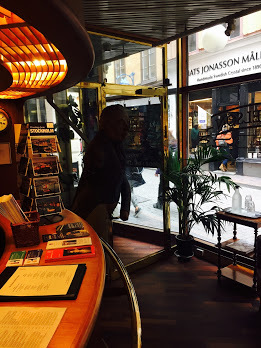
Which was the shape of a boat

and had a roof deck. All the fixtures & fittings were nautically themed. And it was just down the road, in Gamla Stan, from the SF Bookstore everyone told us we had to visit.
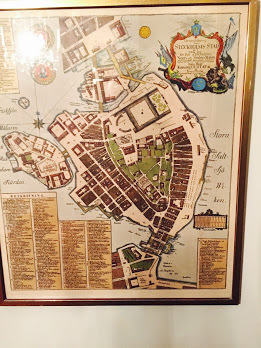
Stockholm is a city of islands and we spent a pleasant time there visiting museums (including the Nobel museum) and got to see a Jacquard Loom in action (big shout out to John Hawkes-Reed - go read his amazingly good stories in Airship Shape & North by Southwest to find out why I was so excited to see a Jacquard Loom in action!)
Sailing (OK it was on a very large ferry) from Stockholm to Aland really illuminated why the Vikings were sailors!

Our welcome to Aland was musical & it seems the Finns can create music on any subject at the drop of a hat.
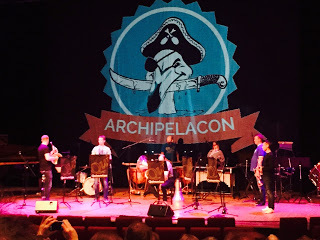
At the con I did a talk, and then tried to act all nonchalent when Mats Strandberg blogged about it (in Swedish)

The cosplay at the Con was of another level

And I ran a panel too with some great comics guests
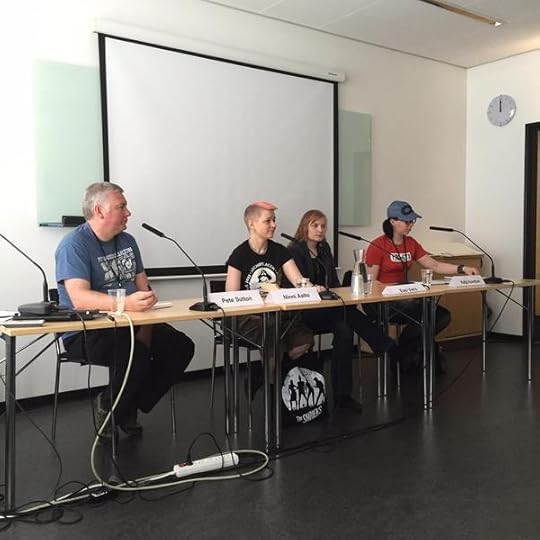
Many thanks to my panelists - Ninni Aalto , Katja Kontturi and Essi Varis
I attended a much higher degree of programming than I usually do and was pushed to find time to eat on the weekend and the con was greatly enhanced by the parties in the hotel next door too.
During which they ran an evil laugh competition - ably won by Dave Gullen
I went to so many panels but some highlights include - Writers from different countries (and the fact that all of them laughed when someone in the audience asked if you can make a living by writing). The short film adaptation of "Who is Arvid Pekon", the hilarious Bimbo panel, the Nordic Weird panel, the Storytelling panel, the talk about Vikings (worth getting up early for), the art display, the sexy times in SF&F panel, and far too many more to mention.
It was a fantastic Con and I'd go back in a shot - but it sounds like it was a one off. So I guess I'll be looking for that Con in Reykjavik next then...
Early Monday morning we said farewell to Mariehamn and sailed back to Stockholm for a day of planes, trains, ferries and automobiles to get us back safe to the UK. Tired, but oh so happy.

Published on July 03, 2015 04:55
June 22, 2015
Guest Post = Brian Freyermuth
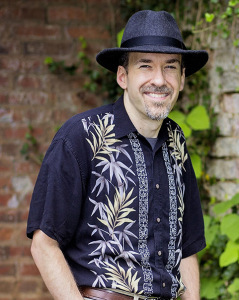
Brian Freyermuth has had a lot of fun over the last 20 years writing video games and novels. His first game, the original Fallout, won countless awards and was featured at the Smithsonian, while his next title had him working with William Shatner, George Takei and Walter Koenig on Star Trek: Starfleet Academy. In 2012, he created a little bit of Disney history with Marv Wolfman by giving Oswald the Lucky Rabbit a voice for the first time in the game Epic Mickey 2: the Power of Two.Creating the Sundancer series, which Brian co-authors with his wife, Juliet, has been an exhilarating process. In Demon Dance , private investigator turned novelist Nick St. James seeks help from a cranky voodoo houngan, a role-playing vampire, and Norse goddess to find out what killed his sister-in-law before it kills an innocent mother and daughter. In the sequel, Mind of the Beast , Nick races against time to find out why the Green Man keeps infecting people, animals and deities.Brian dropped in to talk about Story - one of our favourite subjects here at Bristol Book Blog:
Story: Finding the Pieces in Novels and GamesI’m asked all the time about what is the similar between writing a novel and designing a video game. There are many, but the most important part is story. It’s about creating a world, grabbing the reader or player by the hand and taking them through the twists and turns of the character’s life.
A great example was when I first joined the team working on the original Fallout. I had been writing novels and short stories for years. All of them were atrocious, but a great starting point for my newbie days at Interplay. What I learned on Falloutopened my eyes to a whole new way of writing. Fallout was an open world game, where you could go anywhere, anytime you wanted. How do you write a story when the player can discover the clues in a different order?" Think of it like this. In my novel Demon Dance, the story unfolds at my pace. The main character, Nick, dives into the mystery about who killed his sister-in-law, and you’re there when he finds her body. When he talks to Fay, the local librarian who just happens to be a Norse Goddess, you’re there too. It’s a linear journey from A to B.
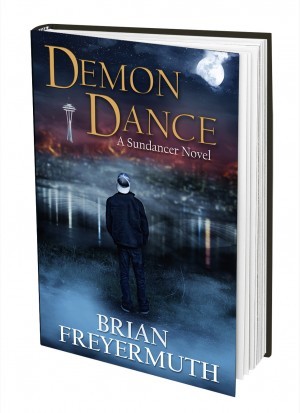 Fallout was more like a series of puzzle pieces that are waiting for the player to stumble across them. At one point, in order to progress to the next piece of the story, we had to create a character named Harold. At first he seemed like your nice old ghoul, maybe a bit on the crazy side, but pretty harmless. But as you dug deeper into his character, you realized that he held a dark secret; one that would open a new part of the game and lead you to the next piece of the mystery. So, while novels are all about pacing and the unfolding of mystery, Falloutwas like a big old treasure hunt.Which isn’t to say that novels can’t be their own type of treasure hunt, or that games can’t have a single narrative. In Mind of the Beast, when Nick’s friend Felix asks him to solve a murder, my wife and I wanted the reader to solve the mystery with Nick. We provided enough clues for the readers to discover the next piece of the puzzle on their own, just like the players did in Fallout. Stories shouldn’t be an observation sport.Unlike the open world of Fallout, Star Trek: Starfleet Academy was a single story from beginning to end. You step into the shoes of Starfleet Academy Cadet David Forrester, on his way through the fabled school of the Federation. Ultimately it was David’s story, but we let the player decide some pretty big things. Like, for example, how to cheat on the Kobayashi Maru. Yes, the player got to figure out how Captain Kirk cheated on the legendary no-win scenario, and then choose if you want to follow in his footsteps. For me it’s always been about the reader or the player being engrossed in the story I want to tell. The tools are different between games and novels, sure, but the end goal is always the same. From wandering the wasteland, to flying the starship Enterprise, to solving mysteries and defeating demons with Nick St. James, I want to take you to places beyond your imagination.
Fallout was more like a series of puzzle pieces that are waiting for the player to stumble across them. At one point, in order to progress to the next piece of the story, we had to create a character named Harold. At first he seemed like your nice old ghoul, maybe a bit on the crazy side, but pretty harmless. But as you dug deeper into his character, you realized that he held a dark secret; one that would open a new part of the game and lead you to the next piece of the mystery. So, while novels are all about pacing and the unfolding of mystery, Falloutwas like a big old treasure hunt.Which isn’t to say that novels can’t be their own type of treasure hunt, or that games can’t have a single narrative. In Mind of the Beast, when Nick’s friend Felix asks him to solve a murder, my wife and I wanted the reader to solve the mystery with Nick. We provided enough clues for the readers to discover the next piece of the puzzle on their own, just like the players did in Fallout. Stories shouldn’t be an observation sport.Unlike the open world of Fallout, Star Trek: Starfleet Academy was a single story from beginning to end. You step into the shoes of Starfleet Academy Cadet David Forrester, on his way through the fabled school of the Federation. Ultimately it was David’s story, but we let the player decide some pretty big things. Like, for example, how to cheat on the Kobayashi Maru. Yes, the player got to figure out how Captain Kirk cheated on the legendary no-win scenario, and then choose if you want to follow in his footsteps. For me it’s always been about the reader or the player being engrossed in the story I want to tell. The tools are different between games and novels, sure, but the end goal is always the same. From wandering the wasteland, to flying the starship Enterprise, to solving mysteries and defeating demons with Nick St. James, I want to take you to places beyond your imagination. 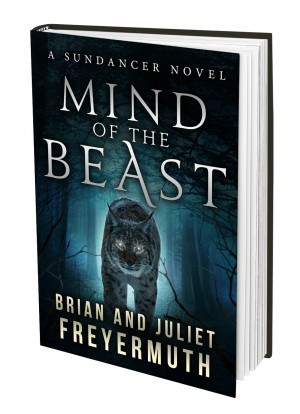 Many thanks to Brian - Go check out the books here
Many thanks to Brian - Go check out the books here
Published on June 22, 2015 03:45
June 19, 2015
Next week I shall be at Archipelacon

I'll be travelling via Stockholm so expect to see some pics of the Nobel centre and the SF Bookshop
Archipelacon looks like a fascinating Con (you can see the program here) and really looking forward to my first out of country con since Octocon in the early 2000's.
I'm on two program items - doing a talk
http://www.archipelacon.org/programit...
and moderating a panel
http://www.archipelacon.org/programit...
Which sounds like scary fun!
I may be a bit slow(er) to respond to mails and stuff until I'm back.
Published on June 19, 2015 04:29
June 12, 2015
Interview with Ben Galley
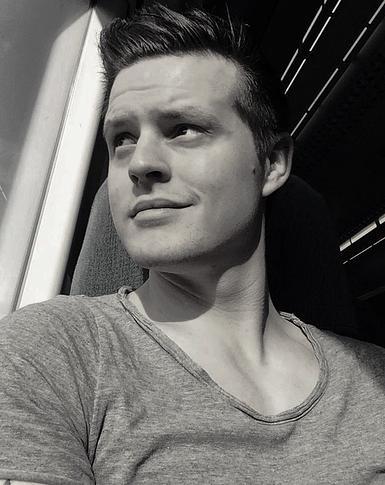
Ben Galley is a young author from sunny England. Ben has been writing since he was old enough to be trusted with a pencil, which, and if you know Ben personally you'll know why, was somewhere in his early teens. Now of course, he's much more responsible, and has moved from the pencil to the self-publishing world. He is the author of the epic fantasy trilogy - The Emaneska Series, as well as a comprehensive self-publishing guide Shelf Help. He has released four books to date, and doesn’t intend to stop writing any time soon.
As a proud indie author, Ben does everything by himself. He writes, edits, sketches the maps, manages tours, does the marketing... even this website was crafted by his very hands. Ben is a frequent guest speaker and lecturer on the subject of self-publishing, and is incredibly zealous about helping other authors and writers. He currently offers 1:1 sessions to other indie authors at his site Shelf Help , and is also a Guardian Masterclass tutor.
Ben is also the co-founder and director of indie-only eBook store Libiro. Libiro.com is a store exclusively for indie authors and self-published books. You can find it at www.libiro.com.
Aside from writing and lecturing, Ben dabbles in music, surfing, climbing, scuba-diving, rat-keeping, and apparently owns an acre of the moon. Ben can be found being loquacious and attempting to be witty on Twitter @BenGalley, or on Facebook /BenGalleyAuthor.
Ben dropped by to have a chat about his latest book, Bloodrush
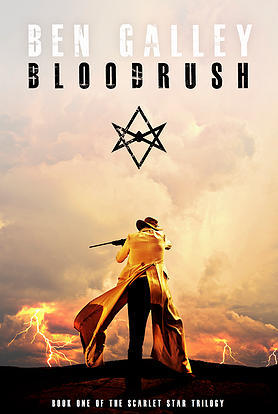
Bloodrush is your fifth fiction book, can you tell us a bit about it, how does it differ to the Emaneska Series?
Bloodrush is a blend of western, dark fantasy and alternate history, set in a twisted and version of Wyoming in 1867, on the frontier of the known world. It follows the story of a high-born and recently orphaned young Merion Hark, who is sent to the brink of civilisation to live with his undertaker aunt. All he wants to do is get home to London and his grand halls, but all the wild west seems to want to do is eat him, kill him, or cheat him out of his father’s empire. Fortunately, he has a few friends to stand by his side, namely a faerie outcast named Rhin Rehn’ar, and something strange running in his blood…
The main difference between the Scarlet Star Trilogy and the Emaneska Series is that it’s far, far away from the Nordic, pseudo-medieval world of Emaneska. In Bloodrush it’s hot, dusty, packed with railroad and guns, and the clattering industry of a more modern world.
You’ve also just brought out a Graphic Novel – how did you find writing for an artist to bring the words to life?
I have indeed, and I really couldn't be prouder of it. The art my artist Mike Shipley has produced is stunning, and I think it’s done The Written (Book 1 of the Emaneska Series) serious justice.
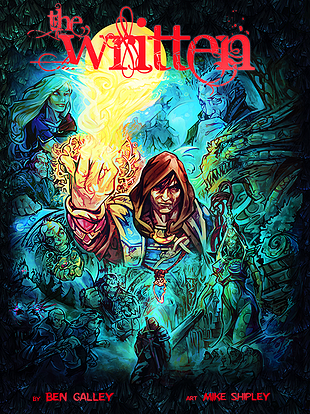
The hardest challenge was trimming the words down into short descriptions and bubbles. We had to take 460 pages and cram them into 120. Mike did a lot of work manhandling scenes so they could tell several pages of story with one picture. I then came in to rewrite the most important snippets he’d taken from the book, to make them flow and reflect the book’s prose. It was tough, and it took us 2 years, but like I said I couldn't be happier.
And you have a new book coming soon for which people can get a sneak peak here ( http://www.bengalley.com/#!Bloodmoon-Sneak-Peek-Spoilers/c1qbb/54d2904a0cf27bee9f0250cf ) Can you whet our appetite for that one?
Absolutely! Bloodmoon is the sequel to Bloodrush and the second book in the Scarlet Star Trilogy. It follows straight on from the epic finale of Bloodrush, and follows Merion and his dysfunctional crew as they trek east towards the coast, and a ship home. Merion’s growing up with every step, but so are the stakes.
You are a bit of a self-publishing guru and help other authors self-publish, what are the top 5 reasons to be an Indie author?
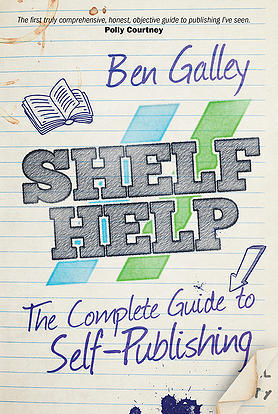
Firstly, control. You act as the project manager for your publishing project, overseeing every aspect such as cover design, editing, formatting, and of course, how the book is published.Secondly, royalties. For indie authors, these are usually a lot higher than they are for traditionally-published authors, ranging up to 70% for eBooks.Thirdly, you get to be as creative as you want. As you’re a one-man or one-woman band, you act like your own small business, and with no external influence, you can essentially write what you want, and dare to experiment, something larger houses can’t do.Fourthly, you get to be closer to the reader. Readers are now the market forces that decide whether your book is a success or not. Thanks to technology and self-publishing, readers can be integrated into the writing process, beta-reading and reviewing. This feedback loop allows indies to write smarter, and connect with their audience.Lastly, because it’s actually viable. With the ability to publish with relative ease and inexpensively, it’s now possible to make a living by going indie, as long as you publish to a high professional standard and you publish great books. Those are the two keys.
You run a store for Indie books ( http://www.libiro.com/ ) – tell us how that came about?
I wanted to experiment with the idea of giving indie authors a dedicated space to sell from. Authors can get lost and drowned out at the major stores, mainly due to size and traditional competition. At Libiro, it’s only indies allowed, so you get a different dynamic. I run the store with a good friend and tech-master Teague Fullick, and we’re just working on our 3rd store design, coming later this year!
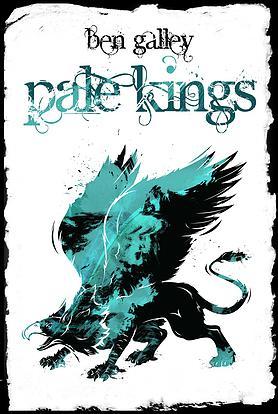
Do you also write short stories? If so where can people find them, if not, why not?
Shorter form fiction is something I’ve been experimenting with over the last few months, and I will be publishing some short stories later in the year. I’ll be surrounding the Scarlet Star Trilogy with backstories and little glimpses at the rest of the world.
What’s the one question you never get asked in interviews that you really want to answer?
If I had one superpower? The ability to stare at a screen and have a book unreel itself from my mind in minutes. I’m highly suspicious that Brandon Sanderson has already achieved this…
Which bit of your writing are you most proud of?
I think every book I write raises my own bar, so at the moment, I’m most proud of Bloodrush. That’s likely to change as soon as I finish and release Bloodmoon however! Specifically, I have to say the section with the railwraith in Bloodrush is currently my favourite of any in the book. It was so much fun to write.
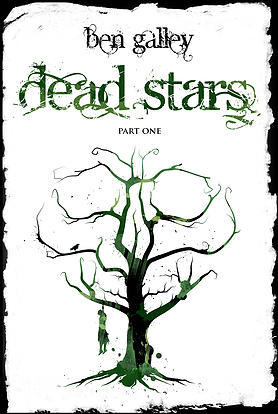 What did you learn about writing by writing Bloodrush?
What did you learn about writing by writing Bloodrush?
Bloodrush taught me a lot about pacing, and how to build a rich environment and world history without boring the reader to death trying to explain it and set the scene. I reveal it gradually, layer by layer, and that’s something I’ll be carrying over to Bloodmoon.
In one sentence what’s your best piece of advice for new writers?
Professionalism is paramount: in design, in prose, and in publishing.
Many thanks to Ben for answering our questions - head on over to his website to check out his books...
Published on June 12, 2015 05:52
June 10, 2015
Some quick reviews
The reader over your shoulder by Robert Graves & Alan Hodge
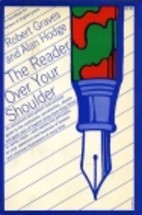
This is ostensibly a book about English Prose style – and how to be good at it. The first couple of chapters have an interesting history of English and its usage. It then gets into “principles of clear statement” using examples from, mostly, non-fiction and the entire second half of the book is a nit picking study of several authors work, highlighting the principles in action (or, mostly inaction). As is common with some of these sort of books there is more than a hint of snobbery and a feeling that, to the author, form is more important than function. The title explains that to Graves & Hodge you are writing for a reader whose understanding should be your main goal.
Overall – A good book to have to hand when editing and to bear in mind whilst writing, but as with all such things not to be set in stone
City of Stairs by Robert Jackson Bennett
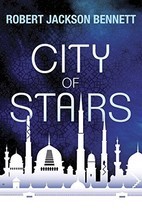
The book opens with a courtroom scene. A man is accused of breaking a law imposed by the conquering Sayypuri on the conquered Continentals to repress any reference to the gods. The Saypuri used to be the ones oppressed by the Continentals, with their gods, but a Saypuri invents a weapon that can kill gods, and uses it, and so the situation becomes reversed. The story is set in Bulikov, the centre of the continent (and once the seat of the gods) and revolves around the investigation into the death of a history professor. Shara, our protagonist is a fully rounded character and her sidekick Sigrud is kick-ass, I also really liked the character of the female general Mulaghesh. Shara is a diplomat/spy with personal ties to the murdered professor and her investigation reveals much more than anyone bargained for. As we progress through the investigation we also explore the fascinating history of the world, the city and the gods as well as Shara and Sigrud’s personal histories. It is a lush world, lovingly detailed, that is a pleasure to explore.
The world is the real star here, although the plot clips along it’s not so groundbreaking. It’s one of those books that you read and wonder why no-one has done it before (or if they have why have you not read it). The gods bend reality so that when they are eliminated there is a “Blink” and the history of the gods is supressed by the invaders. The writing is fresh and fantasy is rarely this interesting or compelling for me. This is no stale Tolkein homage but an interesting blend of what feel like new ideas.
Overall – A hugely enjoyable fantasy
An Egyptian Journal by William Golding
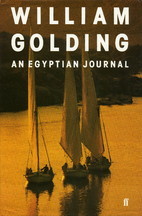
Golding seems to have been ‘pursuaded’ to write this book, a journey along the Nile with his wife, on a boat. He certainly spends the first chapter detailing why he could have written the book without actually visiting and then the rest of the book complaining about all and sundry. The boat is on the verge of breaking down, runs aground in one place and is staffed by people Golding feels no affinity for and finds difficult to relate to, especially since they speak amongst themselves in a language he doesn’t understand. There is an “unspeakable” problem with the toilets, his wife is very ill during the trip and the boat doesn’t travel as far and as fast as he’d like. There isn’t enough space in the cabin and little to do at night. He spends the first few chapters complaining that they can see nothing from the boat as they travel when the Nile is in ebb and they cannot, generally, see over the banks. When they do land and perform excursions in the car carried aboard, the car is always on the verge of breaking down and Golding never seems to enjoy visiting the things the locals want him to see. At one point he is feted as a visiting author and meets the literati of the local area and then complains afterwards that he gets enough of that thing at home. In short he has a thoroughly miserable time, constantly wishing he were elsewhere, which oddly makes for an entertaining read. At the end his summing up takes a few pages to basically say – “well we went there and done that and now it’s over.”
Overall – Oddly compelling contrary travelogue
The write attitude by Kristine Kathryn Rusch
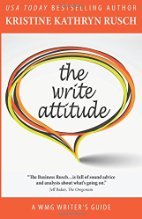
A collection of Rusch’s blog entries about how to cultivate the proper attitude as a writer. Essentially – ‘this is how I work, it gives me the results I want, you should do the same thing as me too’. Interesting insight into one writer’s work ethic & attitude but ultimately very narrow in purview.
Overall – If you like Rusch’s blog then you may enjoy this book, which does at least frame and comment on the blog entries collected.
Explore everything by Bradley Garrett
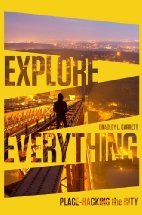
Part political polemic, part ethnographic study (although it is a poor one), part ‘tales of derring do’ and part biography. This book is also well produced and stuffed full of breathtaking photographs. Garrett tries to be an ethnographer of the urban exploration ‘movement’ (a very loose community exists) and his part in one of the ‘crews’. Garrett calls UrbEx ‘Place-hacking’ and it does have great similarity to computer hacking. Garrett and his fellow explorers arm themselves with cameras and scale the heights and plumb the depths of the built environment. Whilst championing the explorer’s vision of entreating people to imagine the city in a different way it also discusses the dangers (some explorers die whilst exploring) and legality (Garrett himself is arrested, as were many of the crew in a crackdown following breaking into the Mail Rail system under London).
Garrett is a writer that has the knack of making you think, and sparks the imagination, at the same time he has crafted a narrative out of several years of exploration and the relationships between the crew. The adrenaline junkie aspect, always wanting bigger, more dangerous, more illicit is dispassionately assessed and the psychology of both those that design the city and those that refuse to conform to the way the city is ‘supposed’ to be used.
Overall – Fascinating and beautifully photographed. Thought-provoking and feeds the imagination

This is ostensibly a book about English Prose style – and how to be good at it. The first couple of chapters have an interesting history of English and its usage. It then gets into “principles of clear statement” using examples from, mostly, non-fiction and the entire second half of the book is a nit picking study of several authors work, highlighting the principles in action (or, mostly inaction). As is common with some of these sort of books there is more than a hint of snobbery and a feeling that, to the author, form is more important than function. The title explains that to Graves & Hodge you are writing for a reader whose understanding should be your main goal.
Overall – A good book to have to hand when editing and to bear in mind whilst writing, but as with all such things not to be set in stone
City of Stairs by Robert Jackson Bennett

The book opens with a courtroom scene. A man is accused of breaking a law imposed by the conquering Sayypuri on the conquered Continentals to repress any reference to the gods. The Saypuri used to be the ones oppressed by the Continentals, with their gods, but a Saypuri invents a weapon that can kill gods, and uses it, and so the situation becomes reversed. The story is set in Bulikov, the centre of the continent (and once the seat of the gods) and revolves around the investigation into the death of a history professor. Shara, our protagonist is a fully rounded character and her sidekick Sigrud is kick-ass, I also really liked the character of the female general Mulaghesh. Shara is a diplomat/spy with personal ties to the murdered professor and her investigation reveals much more than anyone bargained for. As we progress through the investigation we also explore the fascinating history of the world, the city and the gods as well as Shara and Sigrud’s personal histories. It is a lush world, lovingly detailed, that is a pleasure to explore.
The world is the real star here, although the plot clips along it’s not so groundbreaking. It’s one of those books that you read and wonder why no-one has done it before (or if they have why have you not read it). The gods bend reality so that when they are eliminated there is a “Blink” and the history of the gods is supressed by the invaders. The writing is fresh and fantasy is rarely this interesting or compelling for me. This is no stale Tolkein homage but an interesting blend of what feel like new ideas.
Overall – A hugely enjoyable fantasy
An Egyptian Journal by William Golding

Golding seems to have been ‘pursuaded’ to write this book, a journey along the Nile with his wife, on a boat. He certainly spends the first chapter detailing why he could have written the book without actually visiting and then the rest of the book complaining about all and sundry. The boat is on the verge of breaking down, runs aground in one place and is staffed by people Golding feels no affinity for and finds difficult to relate to, especially since they speak amongst themselves in a language he doesn’t understand. There is an “unspeakable” problem with the toilets, his wife is very ill during the trip and the boat doesn’t travel as far and as fast as he’d like. There isn’t enough space in the cabin and little to do at night. He spends the first few chapters complaining that they can see nothing from the boat as they travel when the Nile is in ebb and they cannot, generally, see over the banks. When they do land and perform excursions in the car carried aboard, the car is always on the verge of breaking down and Golding never seems to enjoy visiting the things the locals want him to see. At one point he is feted as a visiting author and meets the literati of the local area and then complains afterwards that he gets enough of that thing at home. In short he has a thoroughly miserable time, constantly wishing he were elsewhere, which oddly makes for an entertaining read. At the end his summing up takes a few pages to basically say – “well we went there and done that and now it’s over.”
Overall – Oddly compelling contrary travelogue
The write attitude by Kristine Kathryn Rusch

A collection of Rusch’s blog entries about how to cultivate the proper attitude as a writer. Essentially – ‘this is how I work, it gives me the results I want, you should do the same thing as me too’. Interesting insight into one writer’s work ethic & attitude but ultimately very narrow in purview.
Overall – If you like Rusch’s blog then you may enjoy this book, which does at least frame and comment on the blog entries collected.
Explore everything by Bradley Garrett

Part political polemic, part ethnographic study (although it is a poor one), part ‘tales of derring do’ and part biography. This book is also well produced and stuffed full of breathtaking photographs. Garrett tries to be an ethnographer of the urban exploration ‘movement’ (a very loose community exists) and his part in one of the ‘crews’. Garrett calls UrbEx ‘Place-hacking’ and it does have great similarity to computer hacking. Garrett and his fellow explorers arm themselves with cameras and scale the heights and plumb the depths of the built environment. Whilst championing the explorer’s vision of entreating people to imagine the city in a different way it also discusses the dangers (some explorers die whilst exploring) and legality (Garrett himself is arrested, as were many of the crew in a crackdown following breaking into the Mail Rail system under London).
Garrett is a writer that has the knack of making you think, and sparks the imagination, at the same time he has crafted a narrative out of several years of exploration and the relationships between the crew. The adrenaline junkie aspect, always wanting bigger, more dangerous, more illicit is dispassionately assessed and the psychology of both those that design the city and those that refuse to conform to the way the city is ‘supposed’ to be used.
Overall – Fascinating and beautifully photographed. Thought-provoking and feeds the imagination
Published on June 10, 2015 04:54
June 2, 2015
Guest post Mocha Pennington - Why I'm Kickstarting my book
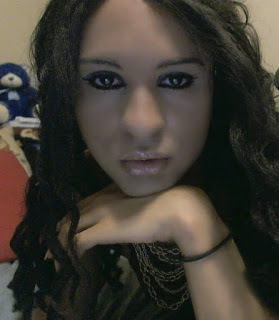 Why I’m Kickstarting my book
Why I’m Kickstarting my book
I’m Mocha, author of The Angel at the Devil’s Gate, a psychological suspense, which I’m hoping to raise enough funding through Kickstarter to self-publish. My novel is about Eli Nunn, a troubled teen who is moved back to Kansas City following the aftermath of a violent drug deal. Returning to a school where his ruthless reputation still thrives, Eli encounters and instantly connects with Angel, a beautiful and mysterious black-clad orphan. Their flourishing romance begins to grow darker when Eli learns details of Angel’s chilling past. Conflicted with alarm and intrigue, Eli accepts a proposal from Angel that puts both their relationship, and lives, in danger.
The concept to my novel materialized while watching an all-day marathon of true crime investigations on the ID channel. After watching three or four episodes, I was eager to write a novel based around a well-plotted murder, but I didn't want to the novel’s main character to be a detective who is using his expertise to solve the murder. I wanted the novel’s leads to be the murderers.

What is Kickstarter? Launched in 2009, Kickstarter is a crowd-funding site with a mission to help creative projects, like art, design and literature, come to life. Since Kickstarter has launched, the company has helped successfully fund over 200,000 projects. In 2014, 22 million dollars went into publishing projects, making them the third most funded projects on Kickstarter that year.
My favorite thing about Kickstarter is that the people who donate money to a project do not walk away empty-handed. Backers receive rewards as a “thank you” from the project’s creator. All the backers who donate to my project will receive my novel in one of its various formats. Among other rewards, I’ll be giving away bookmarks, postcards, one-on-one interviews, posters, and the upper-level backers will receive my next novel upon its completion.
Why Kickstarter? I believe Kickstarter is a perfect recourse for authors who want to self-publishing their work, but they do not have the finances to really give their novel the treatment it deserves. A lot of money goes into producing a successful self-published novel. Professional copy-editors and designers are not only expensive but they’re essential. A main factor to a self-published novel’s success is discoverability. Without your novel actually being discovered and easy to find on the market, the chances of it finding the eyes of readers are very slim. How does one make their novel visible? Promotion. Social media campaigning, Google Search Program, Press Releases and NetGalley (a book reviewing site used by publishing insiders) are among the tools that can help promote a novel and find its audience, and like copy-editors and designers, they can be expensive.
My goal is to raise $6,500 to cover all production and promotional cost as well as the cost to print my novel and to ship it along with all the rewards to my backers. If my project becomes overfunded, I plan to add more rewards for my backers, and depending on how overfunded I am, I’d love to an audio version of my novel.
My project will be live from June 1st – July 10th. If you have any questions or concerns, I’d love to hear from you. Send me a tweet @Mocha_Writer. If you’d like to learn more about my project, see a detailed outline of how I plan to use the funding or to make a pledge, drop by my Kickstarter page, you can also contact me on there.
https://www.kickstarter.com/projects/2105349702/1916545920?token=0d696ac4
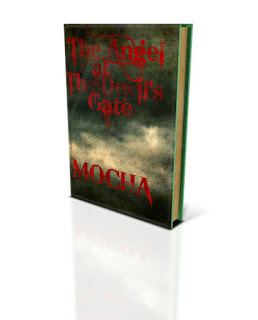 Many thanks to Mocha & Good luck on the Kickstarter - go and check it out!
Many thanks to Mocha & Good luck on the Kickstarter - go and check it out!
Published on June 02, 2015 06:38
May 26, 2015
Some quick reviews
In a glass grotesquely by Richard Sala
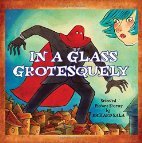
Another solid Richard Sala book, small in format, large in illustration. Sala does what he does best – which is faux gothic.
[image error]
Overall - There is a fiendish super-villain, a dastardly plot, lots of intrigue and plenty of fun.
Saga Vol 2 & Saga Vol 3 by Brian K Vaughan
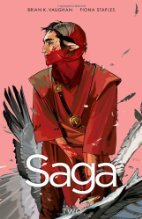
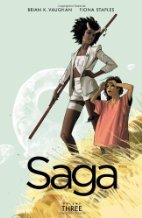
Continuing the saga of Saga – these two volumes skip the plot both forwards and backwards but no spoilers here. If you’ve not checked this series out yet then you should. It’s set in a mixed up universe with a kind of Romeo and Juliet type plot – boy and girl on opposite sides of a very bitter war fall in love, but unlike Shakespeare they have a baby that everyone wants for different reason. Throw in psychotic aliens, bounty hunters, one eyed authors, a tree spaceship and other oddness and mix well. It just works and does so with beautiful art. (I especially liked the first impression of the author)
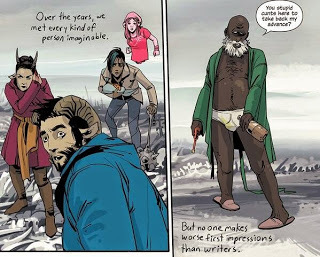
Overall – A great series that is, so far, getting better with each issue.
The explorer by James Smythe
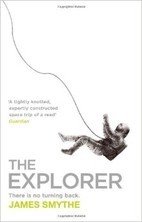
In the near future commercial interests design a space mission to reinvigorate interest in space exploration. A crew is chosen, to include Cormac, a reporter who will blog the mission, pilots and crew and a scientist. The mission is to travel to the furthest point in space ever travelled to by a human manned craft and come back heroes. We join the mission when Cormac is the only crew member left, the mission gone awry, with him wallowing in his despair at his own ignorance of how to turn things round (literally). As the plot progresses we get to find out a lot more about Cormac and how the crew was picked, Cormac’s relationships to them and his wife and more on why, and how, the mission goes so spectacularly wrong. The book is slightly flawed in that it requires you to just accept what’s happening in the middle parts, which don’t actually make sense till the later parts so requires a bit of trust from the reader. I think this flaw could account for some of the poor reviews, as if it hadn’t been for a recommendation I may have questioned it much more, which would have made the trip a lot more wobbly than it was.
Overall – Interesting premise, well executed to make a very entertaining read.
Radio Drama by Tim Crook
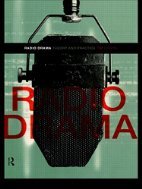
Ostensibly a handbook for how to write radio drama. The tagline says “in theory and practise” but it seems pretty light on practise and very heavy on theory. I think Mr Crook wants to be an academic. The first section is about radio history, the second on communications theory, the third contains several chapters on radio flaps, especially the famous one caused by Orson Wells with War of the Worlds (under the title “live improvisations”). There are also chapters on how “drama guru x’s” theory could be adapted to radio drama. There is useful stuff in here but its buried deep. I was bored by the time I came across the useful stuff, which was more about how radio drama is produced and directed, rather than written. Partly my disappointment with this book is in misunderstanding what it offers, and therefore not getting what I wanted from such a book, but maybe it’s also being mis-sold – Radio Drama brings together the practical skills needed for radio drams, such as directing, writing and sound design, with media history and communication theory. Using extracts from scripts and analysing radio broadcasts from America, Britain, Canada and Australia, the book explores the practicalities of producing drama for radio. That’s from the blurb so that’s what I was expecting, there are scripts in one section of the book, taking up maybe two pages in total.
Overall - Mr Crook didn’t really know what his brief was.
The anatomy of prose by Marjorie Boulton
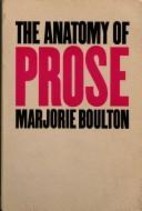
Boulton wrote Anatomy of poetry and then felt sure that someone would have already done the same for prose, to help teach English, when she discovered no-one had she decided to write it herself. This is a bit dated, having been written in the 1950’s, but still worthwhile reading. Boulton performs a kind of Grey’s Anatomy on prose. Cataloguing all the many different types, what it consists of, rhetoric devices and prose rhythm (for which her obviously deep knowledge of poetry comes in handy). Boulton uses examples from both classic and modern (at the time – Steinbeck for example) literature and the explanations are always very clear and understandable.
Overall – A good little book in giving you an appreciation for prose. Useful for both readers and writers.
Writing into the dark by Dean Wesley Smith
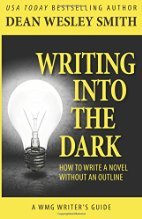
Mr Smith is a seat of your pants writer, but he also rewrites as he goes, circling back every few thousand words. It’s readable in one session (it’s short) and it does have some good tips. But I think Mr Smith assumes that you’re a good enough writer to comply with Heinlein’s 3rd rule of writing (avoid rewriting) and not all writers are. It is nice to see a guide to “pantsing” though since most “how to write” books bang on and on about how important it is to outline. Personally I fall in between the two extremes of planning everything to the nth degree and completely making it up as you go along, having a vague and sketchy plan that I sometimes modify as I go.
Overall – I didn’t get much useful stuff from this, but it does get good reviews so maybe if you a writer looking for tips on how to pants it then this may be for you.

Another solid Richard Sala book, small in format, large in illustration. Sala does what he does best – which is faux gothic.
[image error]
Overall - There is a fiendish super-villain, a dastardly plot, lots of intrigue and plenty of fun.
Saga Vol 2 & Saga Vol 3 by Brian K Vaughan


Continuing the saga of Saga – these two volumes skip the plot both forwards and backwards but no spoilers here. If you’ve not checked this series out yet then you should. It’s set in a mixed up universe with a kind of Romeo and Juliet type plot – boy and girl on opposite sides of a very bitter war fall in love, but unlike Shakespeare they have a baby that everyone wants for different reason. Throw in psychotic aliens, bounty hunters, one eyed authors, a tree spaceship and other oddness and mix well. It just works and does so with beautiful art. (I especially liked the first impression of the author)

Overall – A great series that is, so far, getting better with each issue.
The explorer by James Smythe

In the near future commercial interests design a space mission to reinvigorate interest in space exploration. A crew is chosen, to include Cormac, a reporter who will blog the mission, pilots and crew and a scientist. The mission is to travel to the furthest point in space ever travelled to by a human manned craft and come back heroes. We join the mission when Cormac is the only crew member left, the mission gone awry, with him wallowing in his despair at his own ignorance of how to turn things round (literally). As the plot progresses we get to find out a lot more about Cormac and how the crew was picked, Cormac’s relationships to them and his wife and more on why, and how, the mission goes so spectacularly wrong. The book is slightly flawed in that it requires you to just accept what’s happening in the middle parts, which don’t actually make sense till the later parts so requires a bit of trust from the reader. I think this flaw could account for some of the poor reviews, as if it hadn’t been for a recommendation I may have questioned it much more, which would have made the trip a lot more wobbly than it was.
Overall – Interesting premise, well executed to make a very entertaining read.
Radio Drama by Tim Crook

Ostensibly a handbook for how to write radio drama. The tagline says “in theory and practise” but it seems pretty light on practise and very heavy on theory. I think Mr Crook wants to be an academic. The first section is about radio history, the second on communications theory, the third contains several chapters on radio flaps, especially the famous one caused by Orson Wells with War of the Worlds (under the title “live improvisations”). There are also chapters on how “drama guru x’s” theory could be adapted to radio drama. There is useful stuff in here but its buried deep. I was bored by the time I came across the useful stuff, which was more about how radio drama is produced and directed, rather than written. Partly my disappointment with this book is in misunderstanding what it offers, and therefore not getting what I wanted from such a book, but maybe it’s also being mis-sold – Radio Drama brings together the practical skills needed for radio drams, such as directing, writing and sound design, with media history and communication theory. Using extracts from scripts and analysing radio broadcasts from America, Britain, Canada and Australia, the book explores the practicalities of producing drama for radio. That’s from the blurb so that’s what I was expecting, there are scripts in one section of the book, taking up maybe two pages in total.
Overall - Mr Crook didn’t really know what his brief was.
The anatomy of prose by Marjorie Boulton

Boulton wrote Anatomy of poetry and then felt sure that someone would have already done the same for prose, to help teach English, when she discovered no-one had she decided to write it herself. This is a bit dated, having been written in the 1950’s, but still worthwhile reading. Boulton performs a kind of Grey’s Anatomy on prose. Cataloguing all the many different types, what it consists of, rhetoric devices and prose rhythm (for which her obviously deep knowledge of poetry comes in handy). Boulton uses examples from both classic and modern (at the time – Steinbeck for example) literature and the explanations are always very clear and understandable.
Overall – A good little book in giving you an appreciation for prose. Useful for both readers and writers.
Writing into the dark by Dean Wesley Smith

Mr Smith is a seat of your pants writer, but he also rewrites as he goes, circling back every few thousand words. It’s readable in one session (it’s short) and it does have some good tips. But I think Mr Smith assumes that you’re a good enough writer to comply with Heinlein’s 3rd rule of writing (avoid rewriting) and not all writers are. It is nice to see a guide to “pantsing” though since most “how to write” books bang on and on about how important it is to outline. Personally I fall in between the two extremes of planning everything to the nth degree and completely making it up as you go along, having a vague and sketchy plan that I sometimes modify as I go.
Overall – I didn’t get much useful stuff from this, but it does get good reviews so maybe if you a writer looking for tips on how to pants it then this may be for you.
Published on May 26, 2015 03:42
May 18, 2015
Guest post by Shawna Reppert

Shawna Reppert is an award-winning author of fantasy and steampunk who keeps her readers up all night and makes them miss work deadlines. Her fiction asks questions for which there are no easy answers while taking readers on a fine adventure that grips them heart and soul. You can find her work on Amazon and follow her blog on her website (www.Shawna-Reppert.com). You can friend her on Facebook and follow her on Twitter, where she posts an amazing array of geekery. Shawna can also sometimes be found in medieval garb on a caparisoned horse, throwing javelins into innocent hay bales that never did anything to her.
Shawna has dropped by to talk about Urban Fantasy
Urban Fantasy: Fairytales for Today
The thing that most people forget about fairy tales is that they were born when once-upon-a-time was present-day. People did walk through the woods to Grandma’s house, because there was a lot more woods and a lot more walking. There were knights and woodcutters and chimneys that needed sweeping. Storytellers populated the tales of right-here-right-now with dragons and fairies, unicorns and werewolves. From the gods and demigods of Greek myth to the Seelie and Unseelie courts of the Celts, from Coyote and Raven to the Japanese kitsune who were sometimes foxes and sometimes people, tales of miracles and magic exist in every culture. The human race seems to have developed with the idea that, for good or ill, magic could happen to anyone who wandered off the path in the fog, or took the short-cut through the woods, or made a bargain with a stranger they met at the crossroads. The universality of these tales would indicate that they serve some deep-seated need.In grade school, we were taught that the myths were humanity’s way of explaining things like how the sun moved across the sky before we discovered science. As an adult, I have come to believe that explanation to be somewhat limited.I think that tales of wonder fulfill the human need to find a sense of magic in the world. Confronting the metaphorical dark powers in these tales teaches the soul courage to stand against the real evils of the world. Believing in elves and fairies for the space of a tale helps readers to see and appreciate the beauty of the real world when they surface from the book and look around them. I think the act of suspending disbelief to lose yourself in a tale of werewolves and vampires shakes something loose, leaves you open to seeing things in a new way.
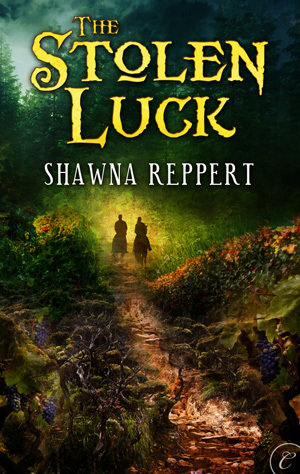
We owe much to Tolkien for re-popularizing fantasy, but for too long writers and publishing houses got stuck in the idea that fantasy had to take place in the long-ago. Or else in the far future (any hard-SF devotee will tell you that Star Wars is space fantasy, not true science fiction. Which I personally consider part of its charm.) Now, don’t get me wrong. I love a good space fantasy as much as the next geek, and I could hardly criticize high fantasy as I write almost as much of that as I do contemporary. But people forgot that fairy tales, the antecedents of fantasy, were born when all the historical trappings were not historical at all. Mary Shelley’s Frankenstein has been called the first science fiction novel. It could also arguably be called the first contemporary fantasy. She set her tale in her own time period, and the ‘science’ bears as much resemblance to Merlin’s alchemy as it does anything else. Certainly the reanimated corpse resonates with myths or religious tales the world over.People ask ‘why urban fantasy’? To me, the only response is ‘why not urban fantasy? I think contemporary fantasy is our culture’s attempt to create its own mythos. As an aside, I prefer the term ‘contemporary fantasy’ to ‘urban fantasy’ as being both more accurate and more inclusive. I mean, what if the story takes place in the suburbs? Does that make it suburban fantasy? My novel Ravensblood takes place mostly in an alternate-universe version of Portland, OR, and so I call it urban fantasy. But a few key scenes take place in and around a cottage in the Old Growth forest of Mariner State (The state of Washington in the Real World). Does that make it an urban/woodland fantasy? How about its sequel, Raven’s Wing, which takes place mostly in AU Portland, with scenes also in unincorporated Newberg and in Arch Cape and a chapter or so in the Australian Outback? Urban/rural/coastal/Outback fantasy? Oh, my.

But since ‘urban fantasy’ is the term readers search under in Amazon and reviewers use when outlining what they will and won’t read, I mostly stick with that.When Ravensblood was still in the developmental stage, I got an excellent piece of advice from an agent I was chatting up at a writer’s conference. (Lest I get a reputation for bad behavior at conferences, let me clarify that I was chatting up as in trying to get into a contract, not into his bed.) I told him I was working on an alternate-universe urban fantasy set in a city very like Portland. He interrupted me right there. “No. Not like Portland. Set it in alternate-universe Portland. Your readers will be much more invested.”
 And he was right. Not only did it help me out in the writing, since I was describing places that existed and that I knew intimately, but it made for much more engaged readers. People who live in the Portland area told me how much they loved the feeling that the story could really happen here, and this despite the fact that the Ravensblood universe is a veryalternate universe version of Portland. Ex-pats of the Pacific Northwest said the descriptiveness of my prose made them nostalgic. Perhaps one of the most surprising payoffs came from my OMSI/OMMSI reference. In the real world, OMSI is the Oregon Museum of Science and Industry. In the Ravensblood universe, there is an extra ‘m’: the Oregon Museum of Magic, Science and Industry. It was just a cheap throw-away I tossed in to amuse locals, a brief mention of Cass seeing the red lights of the OMMSI sign reflected on the river as she crossed one of the many bridges of Portland. But one of my beta readers, a woman who lives in France, e-mailed me all excited because she had done a Google search and found the website for the real-world place. I hadn’t even told her there was a real-world place. When she flew out later visit me and to take the Ravensblood tour of Portland, I greatly enjoyed showing her all the places where, in another version of reality, magic could happen at any moment.
And he was right. Not only did it help me out in the writing, since I was describing places that existed and that I knew intimately, but it made for much more engaged readers. People who live in the Portland area told me how much they loved the feeling that the story could really happen here, and this despite the fact that the Ravensblood universe is a veryalternate universe version of Portland. Ex-pats of the Pacific Northwest said the descriptiveness of my prose made them nostalgic. Perhaps one of the most surprising payoffs came from my OMSI/OMMSI reference. In the real world, OMSI is the Oregon Museum of Science and Industry. In the Ravensblood universe, there is an extra ‘m’: the Oregon Museum of Magic, Science and Industry. It was just a cheap throw-away I tossed in to amuse locals, a brief mention of Cass seeing the red lights of the OMMSI sign reflected on the river as she crossed one of the many bridges of Portland. But one of my beta readers, a woman who lives in France, e-mailed me all excited because she had done a Google search and found the website for the real-world place. I hadn’t even told her there was a real-world place. When she flew out later visit me and to take the Ravensblood tour of Portland, I greatly enjoyed showing her all the places where, in another version of reality, magic could happen at any moment.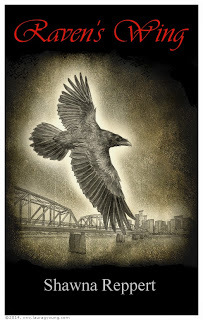
***Go and check out Shawn's site where there's much more information on all her books. Many thanks to Shawna for the interesting post!
Published on May 18, 2015 01:06
May 17, 2015
Guest post by J S Watts

About The Author: J.S.Watts is a British writer who lives and writes in the flatlands of East Anglia in the UK. Her poetry, short stories and reviews appear in a diversity of publications in Britain, Canada, Australia and the States. Her poetry collection, “Cats and Other Myths”, and subsequent multi-award nominated poetry pamphlet, “Songs of Steelyard Sue”, are published by Lapwing Publications. Her dark fiction novel, “A Darker Moon”, is published in the UK and the US by Vagabondage Press. Her second novel, “Witchlight” (ISBN 978-0692406908), comes out in paperback and e-book formats from Vagabondage on 19th May. You can find her website at www.jswatts.co.uk
She's dropped in to talk about "a moment of change"
A Moment of Change
I was about to write that there are two things which fascinate me, but that would be wrong. Many, many things fascinate me and find their way into my writing, but for the purposes of this post there are two things I am going to focus on: the way life can change (for better or worse) in a moment (a blink of an eye, a beat of a heart, the ring of a phone, the ping of an email) and how the things that fascinate me in life invariably end up in my writing, even though my life is pretty mundane and I frequently write about fantasy, science fiction and horror.
So there I was today, working away at something I had planned to do (I have quite a lot on my to do list at present. My new paranormal novel Witchlight comes out in paperback and e-book formats on 19thMay) and suddenly my email pings and there is a message from my publisher saying there’s a last minute opportunity to do a guest post to help with the promotion of Witchlight. Will I respond to it? Of course I will. I’ve committed months of my life and untold emotion to the creation of my new book and I want to do right by it and the characters I have created: see it, and them, on their way out into the big bad and uncertain world as best I can. Then I realise that the deadline is very, very close. The piece has to be submitted before 1st May and today is the last day of April and it’s already almost 5pm. I have less than seven hours in which to write this piece and submit it, cook and eat some dinner, go to Thursday band practice (I’m a French Horn player and no, don’t ask), finish what I am currently working on, sort out the cat, prepare for tomorrow’s three back to back events and go to bed at a reasonable time because I’m up early tomorrow morning.
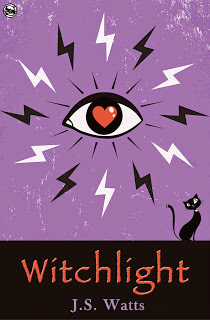 So here I now am, at my keyboard, original work on hold, this evening’s plans interestingly shaken up in the cocktail mixer of life (and no, I doubt that I’ll have time for a real cocktail when 6pm comes round) typing away at this piece. Half a day of plans thrown up in the air at the ping of an email.
So here I now am, at my keyboard, original work on hold, this evening’s plans interestingly shaken up in the cocktail mixer of life (and no, I doubt that I’ll have time for a real cocktail when 6pm comes round) typing away at this piece. Half a day of plans thrown up in the air at the ping of an email.Life was ever thus. I’ve always worked in environments where plans can change in a moment and have long recognised that life itself can change dramatically when the phone rings with good (or bad) news, you make eye contact with someone you did not expect to, your number comes up (in the lottery or in a not so good way).
I guess it is not surprising, therefore, that the lead character in Witchlight finds herself in a not dissimilar position, albeit on a much grander and dramatic scale. In Holly’s case it is thirty-eight years of relatively mundane life that get thrown in the air following an unexpected arrival. Not surprisingly, Holly has been mortal all her life. Then, without portent or announcement, her previously unknown fairy godfather arrives in a puff of turquoise light to tell her she’s a witch, and suddenly she's having to come to terms with the uncertainties of an alarmingly magic-fuelled world, as well as track down the unknown birth-mother who passed on the witchlight that flows in Holly’s veins.
During the course of the novel Holly also gets to make eye contact with someone who might change her life and the phone rings, on more than one occasion, with further life changing news. Magic, it turns out, is not like it is in the books and films, and Holly starts to doubt whether her fairy godfather, Partridge Mayflower, is the fey, avuncular charmer he appears. When appearances are magically deceptive, Holly has to learn the hard way that she cannot afford to trust those closest to her, Including herself. Accidents start to happen, people die, Old Magic is on the hunt, but in the age-old game of cat and mouse, just who is the feline and who is the rodent?
I guess it puts my last minute change of plans into perspective, or perhaps it is into the shade, because Witchlight is a mixture of both light and dark: life’s fun and its tragedies can change in a moment.
***
J.S Watt's previous books "A Darker Moon", "Cats and other myths" and "Songs of Steelyard Sue" are also available, see the website for details
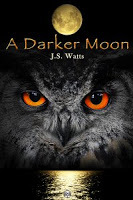
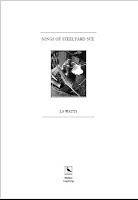

Many thanks to her for the interesting post!
Published on May 17, 2015 06:01
May 13, 2015
I like it but I don't love it - coping with rejections
I wrote a book. I revised and revised. I sent it to several people, including other writers, then revised it a couple of times again. Then I submitted it to agents. Twenty agents.
So far out of those twenty I've received eight rejections. It's probably safe to say that at least eight of the others are rejections since I've had no response from them for more than two months and no response to polite chasing mails.
Three of the agents that have rejected the book have been very kind and have given feedback. This could probably be best summed up with - "I liked it, but I don't love it." Which on the face of it is frustrating but what do they mean?
The publishing industry is incredibly tough, getting a debut author to be treated seriously is very difficult. The agent really has to believe in it for them to be able to champion it, in the face of rejections from publishers, who are mainly driven by marketing and sales nowadays. They need to convince an editor to fall in love with it - in order for the editor to champion it in editorial meetings, to get the rest of the publishing team to fall in love with it too.
It's a very subjective response - each of the three have said that the writing is good enough, but it's about a gut reaction, a 'wow', about getting gripped, for them the book is not unputdownable. As a reader I only feel this with some published books and not with others which shows that this is a subjective response.
So I'm still collecting rejections but I'm encouraged by this.
So far out of those twenty I've received eight rejections. It's probably safe to say that at least eight of the others are rejections since I've had no response from them for more than two months and no response to polite chasing mails.
Three of the agents that have rejected the book have been very kind and have given feedback. This could probably be best summed up with - "I liked it, but I don't love it." Which on the face of it is frustrating but what do they mean?
The publishing industry is incredibly tough, getting a debut author to be treated seriously is very difficult. The agent really has to believe in it for them to be able to champion it, in the face of rejections from publishers, who are mainly driven by marketing and sales nowadays. They need to convince an editor to fall in love with it - in order for the editor to champion it in editorial meetings, to get the rest of the publishing team to fall in love with it too.
It's a very subjective response - each of the three have said that the writing is good enough, but it's about a gut reaction, a 'wow', about getting gripped, for them the book is not unputdownable. As a reader I only feel this with some published books and not with others which shows that this is a subjective response.
So I'm still collecting rejections but I'm encouraged by this.
Published on May 13, 2015 03:41
Pete Sutton's Blog
- Pete Sutton's profile
- 14 followers
Pete Sutton isn't a Goodreads Author
(yet),
but they
do have a blog,
so here are some recent posts imported from
their feed.



